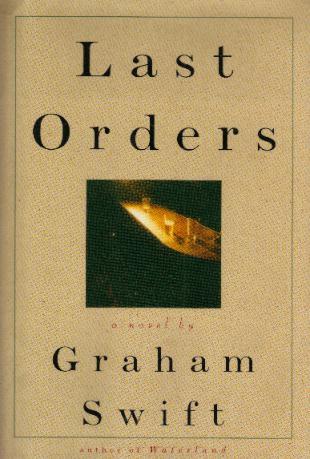
Graham Swift
The following novels constitute the shortlist for the 1996 Booker Prize:
Notable Omissions from the 1996 Shortlist

|
Last Orders Graham Swift |
Dustjacket synopsis:
"Graham Swift's first novel since the highly acclaimed Ever After is a subtle yet
deeply felt exploration of the ways in which friendship and love are shaped by the past and
by fate.
"At its center is a group of men, friends since the Second World War, whose lives revolve around work, family, the racetrack, and their favorite pub. Now, the death of one of them, and the survivors' task of driving their friend's ashes from London to the seaside town where they'll be scattered, compels them to take stock. Through conversation and memory they trace the paths they have followed by choice and by accident: through war and its aftermath, through the dramas of their family lives and of their shifting relationships with one another.
"In brilliantly realized, richly humorous voices, Swift had created a narrative language that perfectly expresses not only the comforts of old habits and friendships but the profound emotional revelations this brief but far-reaching journey will bring them.
"Vivid and immediate, yet timeless in its portrait of human folly, affection, and resilience in the face of death, Last Orders is Graham Swift's funniest and most moving novel to date."
Quotes:
"This is Graham Swift's finest work to date: beautifully written, gentle, funny, truthful,
touching and profound." - Salman Rushdie
"Last Orders is an amazing novel, a metaphor of the journey we all take, watched
over - whether we like it or not - by many attendants. Graham Swift has set up a sort of
two-way mirror, with the subject on one side and the faces of his friends reflected.
Somewhere in that layered mirror is his other life - a life at once private and public,
a life we can only begin to see through facts, anecdotes, and in small takes that belie
larger pictures. Jack has left a fascinating chorus behind, yet they sing different
tunes that sound even more discordant because of their unmeshed voices. Graham Swift has
managed a truly virtuoso performance, allowing everyone a moment in the spotlight, dazzling
the reader at the same time he dazzles the performers, luring us into believing that we
need not notice that the curtain is falling." - Ann Beattie
"Graham Swift is a purely wonderful writer, and Last Orders, full of gravity and
affection and stylistic brilliance, proves it precisely." - Richard Ford
"If you think that novels can no longer move us in all the old deep ways, I'd like to submit
Graham Swift's Last Orders as the most conclusive and beautiful proof that they most
definitely can." - Michael Herr
First Paragraph:
It aint like your regular sort of day.
Bernie pulls me a pint and puts it in front of me. He looks at me, puzzled, with his loose,
doggy face but he can tell I don't want no chit-chat. That's why I'm here, five minutes
after opening, for a little silent pow-wow with a pint glass. He can see the black tie, though
it's four days since the funeral. I hand him a fiver and he takes it to the till and brings
back my change. He puts the coins, extra gently, eyeing me, on the bar beside my pint.
From the Knopf hardback edition, 1996.
Biographical Information on the Author
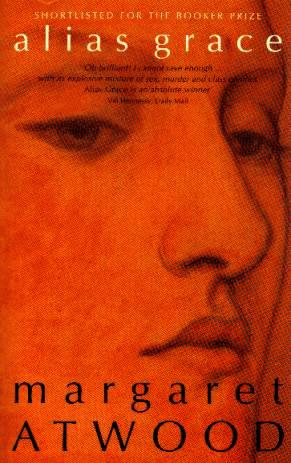
|
Alias Grace Margaret Atwood |
Dustjacket synopsis:
"'Sometimes I whisper it over to myself: Murderess. Murderess. It rustles, like a taffeta skirt
along the floor'. Grace Marks. Female fiend? Femme fatale? Or weak and unwilling victim?
"Around the true story of one of the most enigmatic and notorious woman of the 1840s, Margaret Atwood has created an extraordinarily potent tale of sexuality, cruelty and mystery."
Quotes:
"Oh brilliant! I cannot rave enough...with its explosive mixture of sex, murder and class
conflict, Alias Grace is an absolute winner" - Val Hennessy, Daily Mail
"A sensuous, perplexing book, at once sinister and dignified, grubby and gorgeous, panoramic yet
specific...I don't think I have ever been so thrilled...This, surely, is as far as a novel can go" -
Julie Myerson, Independent on Sunday
"Brilliant...Atwood's prose is searching. So intimate it seems to be written on the skin" -
Hilary Mantel
"Margaret Atwood is to be congratulated" - Anita Brookner, Spectator
"The outstanding novelist of our age" - Peter Kemp, Sunday Times
First Paragraph:
Out of the gravel there are peonies growing. They come up through the loose grey pebbles, their buds testing the air like snails' eyes, then swelling and opening, huge dark-red flowers all shining and glossy like satin. Then they burst and fall to the ground.
In the one instant before they come apart they are like the peonies in the front garden at Mr. Kinnear's, that first day, only those were white. Nancy was cutting them. She wore a pale dress with pink rosebuds and a triple-flounced skirt, and a straw bonnet that hid her face. She carried a flat basket, to put the flowers in; she bent from the hips like a lady, holding her waist straight. When she heard us and turned to look, she put her hand up to her throat as if startled.
From the Virago paperback edition, 1997.
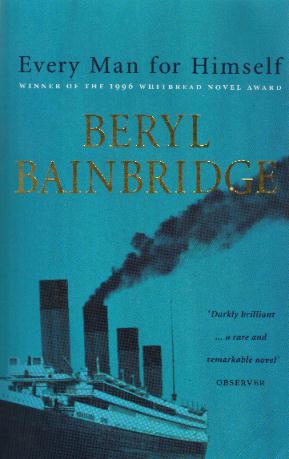
|
Every Man for Himself Beryl Bainbridge |
Dustjacket synopsis:
"For the four fraught, mysterious days of her doomed maiden voyage in 1912, the Titanic sails towards New York,
glittering with luxury, freighted with millionaires and hopefuls. In her labyrinthine passageways are played out
the last, secret hours of a small group of passengers, their fate sealed in prose of startling, sublime beauty,
as Beryl Bainbridge's haunting masterpiece moves inexorably to its known and terrible end."
Quotes:
"Darkly brilliant...a rare and remarkable novel" - Observer
"You will find yourself holding your breath, racing over the words, physically gripping the book...She has never
written better, with such passion, ease and skill, such control. When I had finished the book, I read it again
immediately...The last few pages are beautiful, without a word too many or ill-chosen, and unbearably moving.
Goodness, it is good!" - Susan Hill, Literary Review
"Bainbridge hits a tremendous pace as her story reaches its climax. In a remarkably concise book, shot through with
laconic wit, she establishes, complex characters who engage first the reader's curiosity, then affection" - New Statesman
"Excellent...the prose is always clean and immaculate, but rises with great moving effect to an account of the sinking" - Mail on Sunday
"The outstanding novel of 1996, elegaic, sharp and exquisitely written" - Elspeth Barker, 'Books of the Year',
Independent on Sunday
"Brilliant...do not miss this novel" - Victoria Glendinning, Daily Telegraph
First Paragraph:
He said, 'Save yourself if you can,' and I said firmly enough, though I was trembling and clutching at straws, 'I intend to. Will you stand at my side?' To which he replied, 'Remember, Morgan, not the height, only the drop, is terrible.' Then he walked away, gait unsteady, the cord of his robe trailing the deck.
I saw him once more, in those seconds which dragged by between my leap for the roof of the officers' house and the onrush of water that bore me aloft. He was standing against the rail, one arm hooked through to steady himself, and at first I didn't know him for he had taken off his spectacles; it was the velvet dressing gown I recognised.
From the Abacus paperback edition, 1997.
Notes:
This novel was the winner of the 1996 Whitbread Novel Award.
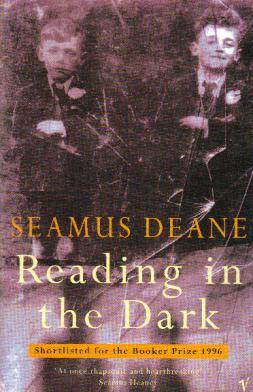
|
Reading in the Dark Seamus Deane |
Quotes:
"Reading in the Dark is a swift, masterful transformation of family griefs and political
violence into something at once rhapsodic and heartbreaking. If Isaac Babel had been born
in Derry, he might have written this sudden, brilliant book" - Seamus Heaney
"Marvellous...almost impossible to put down" - Blake Morrison, Independent on Sunday
"Go into your nearest bookshop and buy Reading in the Dark...A novel that no reader with
any concern for their heart or mind should be without" - A.L. Kennedy, Scotsman
"This is the work of a master story-teller...a book to buy, read and read again" - Julia
Neuberger, Sunday Telegraph
"A wonderful evocation of childhood; a vibrant, unforgettable fragment that leaves you aching
for more" - Robert McCrum, Observer
"A profoundly emotive and seamlessly structured exploration of loss and regret. It is also
funny and authentic. What more could one ask of a book?" - Antonia Logue, Guardian
First Paragraph:
On the stairs, there was a clear, plain silence.
It was a short staircase, fourteen steps in all, covered in lino from which the original pattern had been polished away to the point where it had the look of a faint memory. Eleven steps took you to the turn of the stairs where the cathedral and the sky always hung in the window frame. Three more steps took you on to the landing, about six feet long.
"Don't move," my mother said from the landing. "Don't cross that window."
From the Vintage paperback edition, 1997.
Notes:
This novel was the winner of the 1996 Guardian Fiction prize.
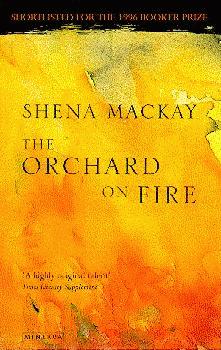
|
The Orchard on Fire Shena Mackay |
Dustjacket synopsis:
"When Percy and Betty Harlency abandon their seedy Streatham pub, for the Copper Kettle Tearoom
in Kent, life for their daughter, April, changes dramatically. She is befriended by the
wonderfully dangerous Ruby, whose red hair reflects her taste for flames, and by Mr Greenridge
whose wife's death and increasing attachment to April seem more than coincidental.
"Shena Mackay has written a rare evocation of a 1950s childhood, laced with the tragic and the bizarre; this is an exceptional and magical novel."
Quotes:
"A writer in her prime...in her hands, words are spiked, crunchy, fraught with super-sensory
meaning: her authorial presence on the page is close to necromantic...Her prose is flawlessly
seductive and comic, confidently wry and sensual" - Julie Myerson, Independent on Sunday
"Shena Mackay is a literary witch so gifted, so powerful in her understanding and in the spell
she casts, so touched with magic, so achingly sad and funny that my breath was taken away" -
Elizabeth Buchan, The Times
"Shena Mackay has brought off something quite rare, a completely unpretentious story written with
the benefit of hindsight...the author has set out a rite of passage which will leave few readers
unaffected" - Anita Brookner, Spectator
"She imbues her work with a gleam of a burnished, amused intelligence and her sharpest novels
and stories posses lustrous, barbed allure" - Tom Adair, Scotland on Sunday
First Paragraph:
I chose this place to live, believing that I would find anonymity among those who did not care if the plaster and glass and paintwork of rented houses splintered and decayed, who were not reproached by gardens gone to seed and rotting sofas. In that hope, as in most things, I was proved wrong. People in the shops, who are living their real lives, even if you aren't, soon start to convince. These are blowzy houses divided into new conversions that generate ancient dust, and next door's great gorgeous crimson full-blown roses pouring over the Russian vine and honeysuckle that holds up the fence, unpruned like my own friable yellow, pink-tinged roses, are persistent reminders that the gardens were loved once.
From the Minerva paperback edition, 1996.
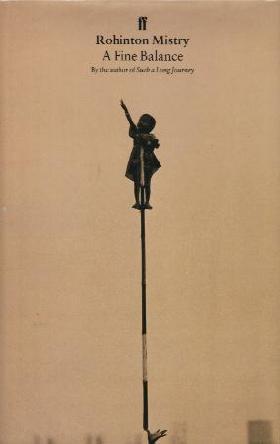
|
A Fine Balance Rohinton Mistry |
Dustjacket synopsis:
"Rohinton Mistry, whose first novel, Such a Long Journey, was shortlisted for the Booker
prize, is an acknowledged master story-teller of contemporary India. In his new novel, A
Fine Balance, set in the mid-1970s, he weaves together a subtle and compelling narrative about
four unlikely characters who come together soon after the government declares a 'State of
Internal Emergency'.
"In the tiny flat of the widowed Dina Dalal, Ishvar and Omprakash Darji, tailors who have been forced from their village into the city, and Maneck Kohlah, a young student from a hill-station near the Himalayas, are painfully constructing new lives which become entwined in circumstances no one could have foreseen.
"The narrative arcs back in time to follow the separate stories of these four individuals - their beginnings, and the places they left behind. In the course of their struggle to survive, they encounter an unforgettable community of characters. Among them: Nusswan, Dina's tyrannical yet well-meaning older brother; Rajaram, the hair-collector turned Family Planning Motivator who befriends the tailors; Mr Vasantrao Valmik, a proofreader who weeps copiously due to an allergy to printing ink; Beggarmaster, wheeling and dealing in human lives; and Sergeant Kesar, head of the City Beautification Squad.
"A Fine Balance is a breathtaking achievement: panoramic yet humane, intensely political yet rich with local detail; and above all, compulsively readable. It is the work of a contemporary novelist at the height of his powers."
First Paragraph:
The morning express bloated with passengers slowed to a crawl, then lurched forward suddenly, as though to resume full speed. The train's brief deception jolted its riders. The bulge of human hanging out of the doorway distended perilously, like a soap bubble at its limit.
Inside the compartment, Maneck Kohlah held on to the overhead railing, propped up securely within the crush. He felt someone's elbow knock his textbooks from his hand. In the seats nearby, a thin young fellow was catapulted into the arms of the man opposite him. Maneck's textbooks fell upon them.
From the faber and faber hardback edition, 1995.
Notable Omissions from the Shortlist:
"The Sunken Road", Garry Disher
"The Arizona Game", Georgina Hammick
"Snake", Kate Jennings (rumoured to be the last eliminated before the final shortlist)
"The Debt to Pleasure", John Lanchester
"Asylum", Patrick McGrath
This page and its contents are copyright © 2002-06 by Perry Middlemiss, Melbourne, Victoria, Australia.
Last modified: November 23, 2004.